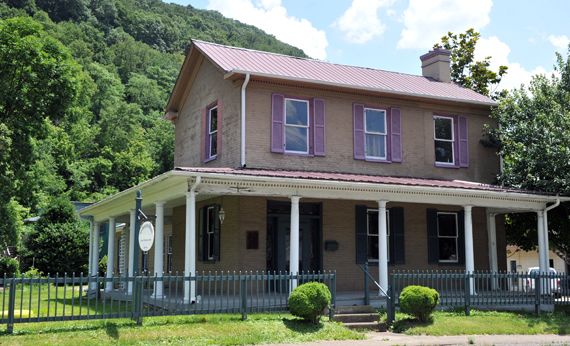Courtesy of West Virginia State University
An archeological field school will be offering students at West Virginia State University (WVSU) the opportunity to uncover more of the history surrounding the Hale House and the early salt industry at Malden. The Hale House is the former home of one of the Kanawha Valley’s early business and political leaders, Dr. John Hale.
Located at 4208 Malden Drive, the field school at the Hale House will offer students the opportunity to dig into the property surrounding the home to try and uncover evidence of other structures that may have been located there, as well as to discover any items that may have historic value.
“The home was built in 1838 and we know that four families have lived there,” said Dr. Michael Workman, associate professor and coordinator of the history program at WVSU. “We will be looking for evidence of other structures on the property, and for anything that might offer a glimpse into the daily life of people in this area in the 1800s.”
The four-week field school begins on Tuesday, June 20, with an orientation on the WVSU campus, and then beginning on Wednesday, June 21, students will be on-site at the Hale House property in Malden daily from 9 a.m. to noon weekly Monday through Thursday, until Thursday, July 13. The public is invited to visit the field school site in Malden during class hours and participate in the dig.
“We even have room for three or more students, who may register for the course through WVSU. Contact me for more information on how to register,” Workman said.
The historic Hale House was built in 1838 and was the one-time home of influential 1800’s Kanawha Valley business and political leader Dr. John Hale. After consolidating various properties between Malden and Charleston by 1860, Hale was the owner of possibly the largest salt works in North America, supplying the thriving meat-packing center of Cincinnati.
After the salt business collapsed in the 1870s, Hale pursued other interests. Among his ventures were the first brick-making machinery in the valley, as well as the Bank of the West, and the first gas company in Charleston. In 1870, Hale started the first steam ferry at Charleston.
Hale was also a leader in having the state capital moved to Charleston in 1870, and he led a group of private investors who built the first Charleston capitol building. In 1871, he became mayor of Charleston. Hale died in 1902 and is buried in Spring Hill Cemetery.
The archeological field school project is being presented with financial assistance from the West Virginia Humanities Council, a state affiliate of the National Endowment for the Humanities. Any views, findings, conclusions or recommendations do not necessarily represent those of the West Virginia Humanities Council or the West Virginia Humanities Grant.

